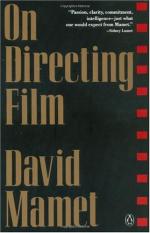
|
| Name: _________________________ | Period: ___________________ |
This test consists of 15 multiple choice questions and 5 short answer questions.
Multiple Choice Questions
1. The second beat of the hypothetical scene in Chapter 2 was to what?
(a) To gain respect.
(b) To arrive early.
(c) To pay homage.
(d) To prepare.
2. What are after-the-fact attempts to shore up that which was not correctly designed in a film?
(a) Editing.
(b) Narration.
(c) Exposition.
(d) Signs.
3. Mamet's house was built without what?
(a) Metal.
(b) Wood.
(c) Nails.
(d) Brick.
4. Mamet cited Aristotle in saying there is no such thing as what?
(a) A happy ending.
(b) Plot.
(c) Character.
(d) A tragic ending.
5. Who characterized the notion of "judge of yourself"?
(a) Eisenstein.
(b) Hemingway.
(c) Stanislavsky.
(d) Herzog.
6. Who wrote The Uses of Enchantment?
(a) Werner Herzog.
(b) Bruno Eisenstein.
(c) Carl Jung.
(d) Bruno Bettelheim.
7. According to Mamet in Chapter 3, "To get into the scene late and to get out early is to demonstrate _____ for your audience."
(a) Respect.
(b) Honor.
(c) Empathy.
(d) Truth.
8. What is the period after you've finished the shot list and before you go into shooting?
(a) Preptime.
(b) Postproduction.
(c) Designer Meetings.
(d) Preproduction.
9. What is the main shot of any given scene?
(a) The focus.
(b) The principle.
(c) The master.
(d) The main.
10. Screenwriting is a craft based on what?
(a) Narration.
(b) Logic.
(c) Exposition.
(d) Science.
11. According to Mamet, you always want to tell a story in what?
(a) Cuts.
(b) Narration.
(c) Character.
(d) Shots.
12. According to Mamet, it is essential to cut that which has what to us?
(a) Narration.
(b) Deep personal meaning.
(c) Explanation.
(d) Emotion.
13. Who did Mamet compare with Frank Capra in Chapter 3?
(a) Alfred Hitchcock.
(b) David Lynch.
(c) Brad Commers.
(d) Werner Herzog.
14. Mamet says you should always do things in what way, in order to make the best movie?
(a) The most artistic way.
(b) The most frugal way.
(c) The least interesting way.
(d) The most interesting way.
15. According to Mamet, the director is seen as what kind of extension of the screenwriter?
(a) Artistic.
(b) Scientific.
(c) Creative.
(d) Dionysian.
Short Answer Questions
1. Mamet says in Chapter 3 that it is the nature of human perception to go to what?
2. Mamet says in Chapter 1 that it is the __________ that makes the movie. What was he talking about?
3. Mamet wrote, "Most _____ directors approach it by saying, 'let's follow the actors around,' as if the film were a record of what the protagonist did."
4. The smallest unit is the shot; the largest unit is what?
5. Who said that the point is what happens to he hero, not what happens to the writer?
|
This section contains 396 words (approx. 2 pages at 300 words per page) |

|




